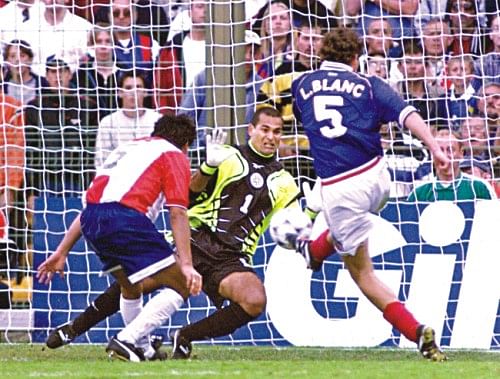Down The World Cup Lane
France 1998: The wait is over for the hosts
Agencies, undated
Having won the World Cup for a record fourth time, Brazil seemed to have the players to make it five. Dunga and Cafu were still there from 1994; Roberto Carlos, a leftback with thighs like jodhpurs had scored with an astonishing freekick against France the previous year; and Rivaldo provided flair and goals from midfield. Even Romario's absence through injury did not look so damaging, now that the 21-year-old Ronaldo had come into his own. With his control and strength on the ball, the current European Footballer of the Year was generally acknowledged as the best attacking player in the world. A 4-2 defeat in Oslo had ended a world record run of 45 matches without defeat, but it was surely just a blip.Of the main challengers, Argentina still had the strike power of Batistuta, abetted by the mercurial little Ortega and the generalship of Veron. Holland came with quality defenders, power and tough in midfield, and the ball skills and goals of Bergkamp and Kluivert. The same was still being said of Croatia, who were there for the first time. Jarni, Boban, Prosinecki and Suker had made a big impression in helping Yugoslavia to win the World Youth Cup back in 1987 but the loss of Alen Boksic appeared to be a major problem up front. Spain, the eternal under-achievers, still had the powerful presence of Hierro and had found a talented new goalscorer in Raul, but there were concerns about the selection processes of their stubborn coach Javier Clemente. Germany were the reigning European champions once again, after reviving memories of Italia 90 by surviving a penalty shoot-out in another semifinal against England. England had looked a balanced and attractive team in that Euro 96 tournament, which was held at home, but then immediately dispensed with the services of the undoubtedly talented Terry Venables, who was replaced by Glenn Hoddle. Italy, forced into a play-off with Russia, won it narrowly. Meanwhile, if France were going to make the most of their home advantage, they needed someone to emerge up front like Fontaine in 1958 -- or, more plausibly, their midfield to paper over the cracks yet again. But their main man there, Zinedine Zidane, had a spotty record in major events. He had again failed to lift Juventus in the European Cup final, finishing on the losing side for the second year running, and had looked tired in the finals of Euro 96. Like England in 1966, the hosts would have to fall back on the best defence in world football. FIFA, still making changes, made some good ones. A board would be held up near the end of each match to show how much injury time was left, and, more importantly, the tackle from behind was banned at long last. A FIFA study showed that 60% of injuries affected the ankles and Achilles tendons, usually as result of such challenges. Citing the case of Marco van Basten, whose brilliant career ended before he was 30, the governing body were adamant that 'We don't want to see such a thing happen again.' The "golden goal", whereby the first team to score in extra-time win the match, was first used and railings and barriers around the pitches were removed to enable spectators to further enjoy the action. Admirable sentiment and necessary change. Perhaps even enough to compensate for the increase in numbers. Thirty-two teams in the same tournament were surely going to be too much of a good thing. On the pitch, Iran and the United States (2-1) managed to forget their differences despite fears that international tension between their respective governments might find its way onto the pitch. Spain were on an early plane home, leaving another Spanish-speaking team, Paraguay, to move forward, led by the inimitable Jose Luis Chilavert. After the group stage Argentina looked dangerous and survived a thrilling match against England which they finally won after a penalty shoot-out to set up a quarterfinal tie against the Dutch, who also looked strong. France finally found a way out of their puzzle with Paraguay when Laurent Blanc scored the first ever World Cup golden goal. The hosts needed penalties to get past Italy in the quarterfinals, while Croatia sprang the surprise of the tournament by decisively ending Germany's shaky run 3-0. Croatia must have been delighted to find themselves in the semifinals after mixing with such august company, but they soon came back to earth after France's Lilian Thuram put two excellent goals past them (2-1). Holland disposed of Argentina in the quarterfinals but lost out to Brazil on penalties in the last four. The final was a curious affair, with Brazil sluggish, slow and lacking ideas, seemingly stunned by Ronaldo's mystery breakdown hours before the game. France needed no further invitation and two headed goals by Zinedine Zidane from corners and a third by Emmanuel Petit in stoppage time sparked celebrations that spread from the Champs Elysees right across the country in a joyous expression of relief and happiness.
|

GOLDEN GOAL RULES: French defender Laurent Blanc scores the first-ever golden goal in the history of World Cup past a diving Paraguay goalkeeper Jose Luis Chilavert on June 28, 1998 at the Felix Bollaert Stadium in Lens. Photo: AFP file |